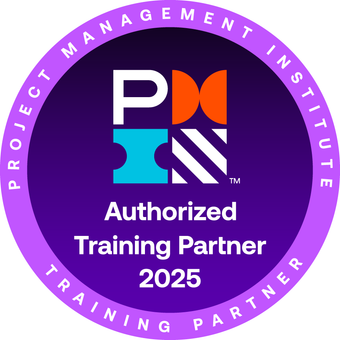PMP Certification Training Course: 4-Day Exam Prep Boot Camp (USA & Canada) in 2025
Our 4-Day PMP training, Instructor-Led PMP certification boot camp is the ideal solution for project managers who are looking to acquire the PMP Certification. The core objective of our PMP course is to adequately prepare students for the PMP examination. By taking our in-person PMP training, taught by our own PMP certified trainers, you can be confident that the training experience will adequately prepare you to pass the PMP examination and receive your PMP certification. We guarantee it with our money-back guarantee!
Achieving PMP Certification
Looking for more information about getting the PMP Certification? Visit our PMP Requirements page to learn everything you need to know to achieve PMP Certification. Use the search function below if you are looking for information about PMP Certification Training in your area.
PMP Training Courses - Money Back Guaranteed
PMP Boot Camp Online Training: Experience
When we refreshed our PMP Boot Camp Training Experience, we wanted to stay true to our extremely successful classroom-style project management boot camp course. To accomplish this we maintained the same time-tested regimen and PMP course itinerary that has been so successful over the past 22 years, while using extremely valuable feedback from our past customers to improve your PMP training experience. The results speak for themselves, but you don't have to take our word for it. Feel free to review our extensive customer reviews and learn why more people have trusted Project Management Training Institute (PMTI’s) classroom PMP training than any other over the past 22 years.
Here's how it works.
You can begin your Project Management Professional PMP Certification prep journey with gathering information about PMP requirements. After going through the PMP Success Guide you may check your eligibility for PMP using our FREE PMP Eligibility Assessment Tool. If you feel you do not qualify for the PMP certification exam, you can send your resume to [email protected] for initial consultation. It's a free service. You may also want to check out a junior level project management certification, Certified Associate Project Manager (CAPM) requirements. In addition to the course materials described below, you will have an in-person PMP training course taught over four (4) consecutive days by an interactive instructor whom you will be able to ask questions, and who will strive to adapt and relate the training to experiences that you and your fellow classmates have. Our PMP courses are designed to provide comprehensive preparation for the PMP exam. During this PMP exam prep course you will earn and learn everything needed to apply, take, and pass the PMP exam. This includes an extensive review of each of the five (5) process groups while straightforwardly weaving each of the ten (10) knowledge areas in over the four (4) day course, full course itinerary below.
Here's what you need.
There are no required materials or prerequisite readings prior to your PMP exam prep boot camp training experience. For the classroom, you may want to bring a snack or two to enjoy throughout the day. While our instructors do a great job of distilling the information, the material is intense and your mind will need all the energy it can get. You will also need the right mindset. While most of our students pass the PMP Exam, the exam material is not trivial and will require your focus and engagement throughout the course. We don't call it a project management boot camp for no reason.
What Does The PMP Boot Camp Course Include?
- Hard & Digital Copies of All Four Proprietary PMTI PMP Classroom Training Books
- PMP Exam Prep Blue Book
- PMP Exam Prep Question Bank
- PMI Authorized PMP Exam Prep
- PMP Exam Prep Orange Book
- Complete Recorded Video Set with Complete Course Material
- Supplemental Key Topic Videos
- A PMP Certification Exam Diagnostic Test
- Our Proprietary PMP Application Preparation Tool
- A PMP Success Roadmap
- Course Completion Certificate for 35 PDUs or contact hours
- Free 53 PDU's to Extend Your PMP Certification to 6 Years
- PMTI Swag Bag

PMP Boot Camp Course Curriculum
- Kick-Off
- Description of the exam and its environment
- PMTI PMP exam strategies & tips, and tricks
- Module 1 - Creating a High-Performing Team
- Creating a High-Performing Team
- Define Team Ground Rules
- Build Shared Understanding
- Negotiate Project Agreements
- Empower Team Members and Stakeholders
- Lunch Break
- Day One Midday Exam
- Review of Questions & Answers
- Module 1 - Creating a High-Performing Team
- Ensure Team Members and Stakeholders Are Trained
- Engage and Support Virtual Teams
- Module 2 - Starting The Project
- Determine Appropriate Project Methodology/Methods and Practices
- Plan and Manage Scope
- Day One Evening Exam
- Review of the PMP Exam Questions & Answers
- Day One Sign-Off
- Day One Concepts Review
- Module 2 - Starting The Project
- Plan and Manage Budget, and Resources
- Plan and Manage Schedule
- Plan and Manage Quality of Products/Deliverables
- Lunch Break
- Day Two Midday Exam
- Review of Questions & Answers
- Module 2 - Starting The Project
- Integrate Project Planning Activities
- Plan and Manage Procurement
- Establish Project Governance Structure
- Plan and Manage Project/Phase Closure
- Day Two Evening Exam
- Review of the PMP Exam Questions & Answers
- Day Two Sign-Off
- Day Two Concepts Review
- Module 3 - Doing The Work
- Assess and Manage Risks
- Execute Project to Deliver Business Value
- Manage Communications
- Engage Stakeholders
- Create Project Artifacts
- Lunch Break
- Day Three Midday Exam
- Review of Questions & Answers
- Module 3 - Doing The Work
- Manage Project Changes
- Manage Project Issues
- Ensure Knowledge Transfer to Project Continuity
- Module 4 - Keeping the Team on Track
- Lead a Team
- Support Team Performance
- Day Three Evening Exam
- Review of the PMP Exam Questions & Answers
- Day Three Sign-Off
- Day Three Concepts Review
- Module 4 - Keeping The Team On Track
- Address and Remove Impediments, Obstacles, and Blockers
- Manage Conflict
- Collaborate with Stakeholders
- Mentor Relevant Stakeholders
- Apply Emotional Intelligence to Promote Team Performance
- Lunch Break
- Day Four Midday Exam
- Review of Questions & Answers
- Module 5 - Keeping the Business In Mind
- Manage Compliance Requirements
- Evaluate and Deliver Project Benefits and Value
- Evaluate and Address Internal and External Business Environment Change
- Support Organizational Change
- Employ Continuous Process Improvement
- Day Four Evening Exam
- Review of the PMP Exam Questions & Answers
- Day Four Sign-Off
In addition to our regular PMP certification training sessions, we're excited to present a unique option: PMP Weekend Course. This intensive program is ideal for individuals with packed schedules who are determined to achieve their PMP certification.
Recent Customer Reviews
Jan 2025
This course trained me well for the pmp exam. 4 day in-person boot camp training along with access to their exceptional site with videos and sample questions prepared me well.
June 2024
SOOOOO much useful videos, visual aids, and paractice questions available till you pass. once I followed the recommendations (Like a project) before testing I didnt even realize how I began to "think PMI" which made the 4 hour test so much more manageable...this program is worth more than its weight in gold...
Frequently Asked Questions
Yes, the PMP exam is challenging, with a first-attempt pass rate of 61%. Candidates often face complex questions, time constraints, and test anxiety. Proper preparation, including studying the PMBOK® Guide and practicing mock exams, is crucial for success in this rigorous project management certification test.
Yes, passing the PMP exam in 3 months is achievable with dedication and a structured study plan. On average, candidates spend 2–3 months preparing, dedicating 2–3 hours daily. A balanced approach includes mastering PMBOK concepts, practicing mock exams, and understanding agile methodologies to ensure success within this timeframe.
The PMP certification cost includes an exam fee of $425 for PMI members and $675 for non-members. Training courses range from $500 to $3,500 depending on the provider. Additional costs may include study materials, PMI membership ($164/year), and retake fees, making the total investment vary by individual needs.
While PMI does not publish a fixed passing score, achieving 70% or higher on practice exams is strongly recommended. Most successful candidates aim for at least 75% confidence to meet PMI’s high standards and improve their chances of passing the PMP certification exam.
PMP-certified professionals earn an average salary of over $120,000 annually in regions like California. Globally, PMP holders enjoy a 16–32% salary boost over non-certified peers. This certification enhances earning potential, career opportunities, and professional credibility.
No, the PMP exam is a closed-book test. Candidates are not allowed to bring any study materials. Success depends on knowledge of project management principles, including predictive, agile, and hybrid methodologies, to complete 180 questions within about four hours.
Yes, PMP certification is valid for three years. To maintain it, professionals must earn 60 PDUs (Professional Development Units) during that period. If not renewed, the certification expires and reapplication or retaking the exam is required.
Preparing for the PMP exam typically takes 2–6 months, with most candidates averaging around 4 months. This includes daily study sessions, reviewing the PMBOK® Guide, completing mock tests, and earning 35 contact hours of formal education.
Joining the Project Management Institute (PMI) costs $164 annually (as of 2025). Membership benefits include access to resources, certification discounts, and professional networking. Students and retirees are eligible for reduced rates.
Yes, PMP certification continues to be in high demand globally. It’s valued across industries like IT, construction, and healthcare. With the shift to Agile and hybrid project methodologies, PMP certification remains highly relevant in 2024 and beyond.
Yes, PMP certification significantly increases salary. According to PMI’s 2024 Salary Survey, PMP-certified professionals earn 33% more globally and up to 44% more in the U.S. than non-certified peers. The credential boosts career growth, recognition, and marketability.
Yes, you can take the PMP exam from home. However, some candidates have reported issues with online proctoring. For a smooth experience, ensure a stable internet connection and follow all Pearson VUE guidelines carefully.
Yes, many companies sponsor employees for PMP certification. They may cover exam fees, training costs, and study materials, viewing it as an investment in better project outcomes and employee development.
No, the PMP certification is not lifetime. It is valid for three years. To maintain it, professionals must earn 60 PDUs and stay in "Good Standing" with PMI during each renewal cycle.
The average first-time PMP pass rate is estimated at around 60%. Success depends on solid preparation, including understanding the PMBOK® Guide, completing practice exams, and meeting PMI eligibility requirements.
The PMP exam lasts 230 minutes (approximately four hours) and includes 180 questions in formats such as multiple choice, matching, and hotspot questions.
The PMP exam does not publish official scores, but most experts recommend scoring 70–75% on practice tests to improve your chances of passing. A good score shows strong understanding of predictive, agile, and hybrid approaches.
Yes, the PMP exam includes multiple-choice questions, but also features multiple response, matching, hotspot, and limited fill-in-the-blank formats across 180 questions.
The average age of PMP-certified professionals falls between the late 20s and 40s. Since the exam requires relevant project management experience, most candidates pursue it mid-career for career advancement.
To fulfill the 35 contact hour requirement for PMP, candidates can take training from PMI Authorized Training Partners (ATPs) like PMTI. These hours can be earned via live classes, in-person workshops, or self-paced e-learning, all aligned with PMI standards.
You can attempt the PMP exam up to three times within your one-year eligibility period. Each retake requires paying a re-examination fee. If all three attempts are unsuccessful, you must wait one year before reapplying.
The PMP exam costs $425 for PMI members and $675 for non-members. Additional expenses may include PMI membership fees ($164/year), training programs, study materials, and retake fees, making the total cost variable based on individual preparation needs.
The PMP certification is highly prestigious and globally recognized as the gold standard in project management. It signals advanced expertise in predictive, agile, and hybrid methodologies, enhancing both career opportunities and earning potential across industries.
Yes, candidates without a bachelor’s degree can still earn a PMP certification. They need five years (60 months) of project management experience and 35 contact hours of formal project management education.
The PMP no longer requires tracking hours. Candidates with a four-year degree need 36 months of experience. Those without a degree need 60 months. The old requirement of 4500/7500 hours has been replaced by a focus on experience duration within the past eight years.
Yes, many project managers earn $100,000 or more annually, especially those with a PMP certification. In high-demand regions and industries, salaries can reach $160,000 or higher, depending on experience and role.
PMP-certified professionals often earn more than Six Sigma-certified individuals, especially in project-based roles. PMP emphasizes leadership and delivery, while Six Sigma focuses on process improvement. Salaries vary, but PMP has broader demand across sectors.
Yes, PMP complements an MBA by adding practical project leadership skills. This combination boosts career competitiveness, salary potential, and demonstrates both strategic and executional expertise to employers.
Yes, you can self-study for the PMP exam using the PMBOK Guide, practice tests, and online materials. However, you must still complete 35 hours of formal education, which can be fulfilled through self-paced or instructor-led courses.
You can attempt the PMP exam up to three times within your one-year eligibility period. Each retake requires a fee. After three failed attempts, you must wait one year before reapplying.
Yes, joining PMI is worth it for access to exclusive resources, exam discounts, networking, and ongoing professional development. Membership costs $164/year and provides great value for aspiring and certified project managers.
Yes, some candidates do fail the PMP exam due to insufficient preparation, complex question formats, or time pressure. The average first-attempt pass rate is estimated around 60%, highlighting the importance of thorough study and regular practice tests.
No, you cannot take the PMP exam without completing 35 contact hours of formal project management education. This requirement ensures candidates have foundational knowledge and can be fulfilled through self-paced or instructor-led training programs.
A PMP Boot Camp is a success-oriented intense course designed to take you from the ground up to the global standards of PMI-PMP ethics and practices, while also ensuring you pass the exam for the coveted PMP certification.
When preparing for the PMP exam, long-term prep options are exam suicide. You need to take an in-person or online pmp boot camp that will prep you for the exam quickly, efficiently, and ensure you sit for the exam and pass immediately following the training.
PMTI's PMP boot camp isn't just exam prep. Aside from the prep tools like online self-study, practice tests and application assistance, we'll ensure your eligibility, help you through the application/audit process, and ensure you are fully prepared to pass the PMP on your first attempt!
There's no doubt about it! PMTI has a great pass rate overall and has stayed consistent for almost 22 years! We'll back that claim with our money-back guarantee!




 Leaders in PM industry for 22+ years
Leaders in PM industry for 22+ years Pioneers of 100% pass guarantee
Pioneers of 100% pass guarantee
 Authorize.Net trusted transactions
Authorize.Net trusted transactions Satisfies 35 contact hours
Satisfies 35 contact hours




